Presidents 37-39
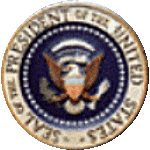

Richard M. Nixon
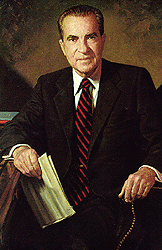
In February 1972, Richard Nixon became the first American President to visit
China. Americans watched him on television as he exchanged toasts with Chinese
leaders and visited the Great Wall. And yet, little more than two years later,
Nixon would become the first President to resign his office in disgrace.
Born on January 9, 1913, in Yorba Linda, California, Richard Milhouse Nixon
grew up to be a hard-working lawyer. He served in the navy during World War
II, and then returned to California to run for Congress as a Republican. After
two terms in the House, Nixon won a Senate seat. In Congress, Nixon earned a
reputation as a right-wing anti-communist.
Dwight Eisenhower chose Nixon as his running mate in 1952. Eisenhower thought
the conservative Nixon would balance the ticket (Eisenhower was a moderate
Republican), and would help the Republicans win California. Eisenhower and
Nixon won the election. Nixon was Vice President for two terms. He was an
active Vice President and often represented the President abroad, traveling to
more than 56 countries.
In 1960, Nixon ran against John Kennedy for the White House. It was one of the
closest races in history, but Nixon lost. In 1962, Nixon ran for the
governorship of California, but lost again. He moved to New York to practice
law. For a while, it seemed as if Nixon's political career was over. But
during the Kennedy and Johnson years, Nixon kept in touch with Republican
leaders. In 1968, they chose him to be their presidential candidate once
again. This time, Nixon beat Democrat Hubert Humphrey.
Nixon's biggest problem during the early years of his presidency was the
Vietnam War. Nixon slowly but steadily reduced the number of American troops
in Southeast Asia, yet he also expanded the fighting to Cambodia and Laos. The
widening war drew increased protests at home. But in August 1972, the last
American ground troops left Vietnam. A peace agreement was signed in Paris in
January, 1973 that allowed American prisoners of war to return home.
Nixon faced a Democratic majority in Congress, and most of his achievements
are in foreign policy. Nixon established normal relations with communist China
and made his memorable visit. In May 1972, Nixon and Soviet leader Leonid
Brezhnev signed the first Strategic Arms Limitation Talks (SALT) agreement.
This agreement helped to slow the arms race and reduced American-Soviet
tensions. Running for reelection on these achievements, Nixon easily defeated
Democrat George McGovern in 1972.
Nixon's second term was slowly destroyed by the Watergate scandal. On June 17,
1972, five men who worked for Nixon's reelection committee were arrested while
trying to burglarize the Democratic National Headquarters at the Watergate
Hotel in Washington, D.C. The investigation that followed gradually revealed a
corrupt side to the Nixon administration. The President and his associates
regarded political opponents as enemies to be destroyed -- whether by legal or
illegal means. Nixon may not have authorized many of the "dirty
tricks" that were carried out in his name. But it became clear that he
was involved in covering up the crimes of his underlings.
While the Watergate investigation was underway, a separate investigation
revealed that Vice President Spiro Agnew had taken bribes while governor of
Maryland. Agnew resigned in order to escape prosecution, and Nixon replaced
him with Gerald Ford, a member of Congress. In July 1974, the House Judiciary
Committee voted to impeach Nixon. To avoid impeachment, Nixon resigned on
August 9, 1974, and Vice President Ford became President. The new President
quickly pardoned Nixon. Nixon called the pardon "the most humiliating day
of my life."
In retirement, Nixon wrote books on foreign policy. He died of a stroke on
April 23, 1994.
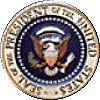
Gerald R. Ford
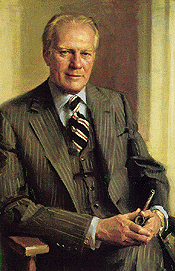
No man ever came to the White House in a more unusual way than did Gerald
Rudolph Ford. Ford was the first President who was never elected to either the
presidency or the vice presidency. Instead, Ford was chosen by President
Richard Nixon to replace Vice President Spiro Agnew, who had resigned his
office in disgrace. When Nixon himself resigned, Ford was elevated to the
highest American political office.
"Jerry" Ford was born in Omaha, Nebraska, but he grew up in Grand
Rapids, Michigan. Ford was a handsome and athletic young man who was
especially good at football. He coached football and boxing while attending
Yale Law School. When the United States entered World War II, Ford joined the
navy. For most of the war, Ford was a gunnery officer on an aircraft carrier,
and he took part in many of the major battles in the South Pacific. After the
war, Ford returned to Grand Rapids to practice law and to run for Congress. He
won his first seat in 1949, and was reelected 11 times.
Ford's honesty and sunny disposition made him a popular member of Congress.
His highest goal was to become Speaker of the House. But Ford realized that as
a moderate Republican, he had no chance of reaching that goal in a Congress
controlled by Democrats. He had decided to retire from Congress in 1976. But
in 1973, Nixon chose him as the new Vice President. Ford was easily confirmed
by Congress, and on December 6, 1973, he took the oath of office as Vice
President. Less than a year later, Nixon's resignation made Ford President.
One of Ford's first acts as President was to pardon Nixon for any crimes he
might have committed as President. Ford wanted the nation to put the
"long national nightmare of Watergate" behind. But many people
thought Nixon should have been tried for his crimes, and the pardon cost Ford
much popularity and support.
One of the major problems Ford faced was an economy in recession. Whip
Inflation Now (WIN), Ford's program of voluntary wage and price controls, was
a failure. Nor did his attempts to cut taxes and government spending seem to
help. The unhealthy economy hurt Ford politically, and he was defeated by
Democrat Jimmy Carter in the presidential race of 1976.
Ford entered an active retirement, writing his memoirs, serving on corporate
boards, and enjoying skiing and golfing.

Jimmy Carter
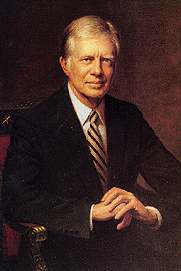
"I will never lie to you," said presidential candidate Jimmy Carter.
In the wake of the Watergate Affair and the Vietnam War, Carter's sincerity
and enthusiasm were a winning combination.
James Earl Carter, Jr. grew up in Plains, Georgia. He attended Annapolis Naval
Academy and entered the navy in 1946. There, he joined the submarine service,
and later became a nuclear submarine officer. When his father died, Carter
resigned from the navy to run the family peanut farm. Carter applied modern
agricultural methods on the farm and it eventually made him a millionaire.
In 1962, Carter ran for the Georgia state senate, and won his seat after
proving that his opponent had committed vote fraud. He won the governorship of
Georgia in 1970. Carter proved to be a progressive governor who fought racism
and promoted education.
In 1972, Carter began campaigning for the presidency. It seemed impossible at
first that an obscure one-term southern governor could win. Carter's
surprisingly strong showing in the primaries attracted enormous media
attention. Campaigning as a Washington outsider, Carter promised a more
honest, open, and responsive government. He defeated President Ford by a
narrow margin.
Carter proved to be as hard-working and straightforward as he had promised.
But many of the problems he faced had no easy solution. The nation's economic
woes were aggravated by oil price increases from the Organization of Petroleum
Exporting Countries (OPEC). Between 1978 and 1979 the price of oil rose almost
500 percent. It would take years for the economy to adjust to a new world of
expensive energy. To make matters worse for Carter, on November 4, 1979,
Iranian militants seized the United States embassy in Iran and took more than
60 hostages. The Iranians soon released women and African Americans, but 52
hostages were held for more than a year. Carter froze Iranian assets in the
United States, mounted an all-out diplomatic effort, and finally authorized a
rescue attempt on April 24, 1980. The operation failed when American rescue
helicopters malfunctioned and collided in the Iranian desert. Carter resisted
pressure for a stronger military response, which probably would have led to
the deaths of some or all of the hostages. Iran finally agreed to release the
hostages in exchange for their frozen assets.
One notable triumph of his presidency was Carter's key role in negotiating a
peace treaty between the Middle Eastern nations of Egypt and Israel. But the
hostage crisis was a humiliating experience for many Americans, and Carter
suffered for it at the polls. In 1980, Carter lost his reelection bid to
Republican Ronald Reagan.
Carter has been the most active ex-president since Theodore Roosevelt. He has
built housing for the homeless in the United States, monitored elections in
emerging democracies aboard, and has written several books. Most important,
Carter has used his special talents as a negotiator to help settle more than
one tension-laden international dispute.

All images of Presidents are courtesy of whitehouse.gov
Information taken from Software titled "American Heritage The History of
the United States for Young People.
The copyright belongs to: Forbes
Inc. and Byron Preiss Multimedia Company. Thank You!

Washington, Adams, Jefferson
Madison, Monroe, Adams
Jackson, Van Buren, Harrison
Tyler, Polk, Taylor
Fillmore, Pierce, Buchanan
Lincoln, Johnson, Grant
Hayes, Garfield, Arthur
Cleveland, Harrison, Cleveland
McKinley, T. Roosevelt, Taft
Wilson, Harding, Coolidge
Hoover, F. Roosevelt, Truman
Eisenhower, Kennedy, Johnson
Nixon, Ford, Carter
Reagan, Bush, Clinton
Bush, ????, ????
|

|
All graphics and
pages are copyright © 1997 - 2008 Pages 4 Ever
(except where noted). Do not take, copy, steal, plagiarize or use in any
way, shape or format without the express written permission of Pages
4 Ever.
Some backgrounds and graphics made from clipart acquired from ArtToday, Boxed Art,
friends, my own imagination, and/or
graphic CD collections that I have purchased. If you find anything on this site
that you have copyright to, and can prove it, please let me know and I will
gladly either remove it or place a link back to you, whichever you prefer.
If you should find any broken links, please drop us a line and let us know the
exact URL the broken link is on. Thank you.
|

|
![]()




